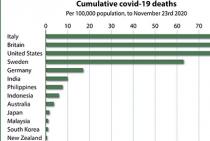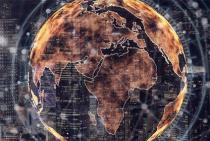The world’s current vaccination plan is very much “broke,” and nobody seems to be fixing it, despite the disastrous consequences for lives, livelihoods, and the global economy. This was supposed to be the year of recovery. But, from an epidemiological standpoint, it is shaping up to be worse than 2020, and current dynamics suggest that 2022 will be no better. It does not have to be this way. But getting onto a better path will require strong global leadership. The world has multiple effective vaccines available. But it is not moving nearly fast enough to administer them. - By Ricardo Hausmann.
You are here
Results for Economics
Wednesday 30 December 2020
London, United Kingdom
In the early stages of the COVID-19 pandemic, it was common to divide countries and their responses according to their political systems, with many attributing China’s success in controlling the virus to its authoritarianism. As of late 2020, however, it is clear that the real dividing line is not political but geographical. Regardless of whether a country is democratic or authoritarian, an island or continental, Confucian or Buddhist, communitarian or individualistic, if it is East Asian, Southeast Asian, or Australasian, it has managed COVID-19 better than any European or North American country. The fact remains that you were much likelier to die of COVID-19 in 2020 if you were European or American than if you were Asian. - By Bill Emmott
Friday 11 December 2020
Queanbeyan, Australia
I agree with you that the PACER Plus trade agreement is of questionable benefit for Tonga. But I do not share your concern for Tonga’s trade deficit. Over the last year, Tonga’s foreign reserves have increased about 19% to the equivalent of nearly 10 months’ imports. If the balance of trade were a problem for Tonga, its foreign reserves would be declining. - Leigh Harkness
Tuesday 8 December 2020
Cambridge-MA, USA
According to the conventional wisdom, the twenty-first century will be characterized by the global shift from American hegemony to Sino-American rivalry. But a bipolar international order is neither inevitable nor desirable, and in fact, would be deeply unstable. Its emergence would heighten the risk of violent conflict and three of the biggest challenges facing humanity would either be ignored or made worse. We should start imagining and working toward alternative arrangements. - By Daron Acemoglu.
Friday 1 June 2018
London, United Kingdom
A big reason why Western politics is in such disarray is voters’ pessimism about the future. Today’s naysayers come in three shades: Accepting pessimists; Anxious pessimists and ...finally, Angry pessimists – often populists and their supporters – who think economies are rigged, politicians corrupt, and outsiders dangerous. They have no desire to manage decline; they want to destroy the status quo. And they may pursue lose-lose outcomes simply so that others will suffer. What these groups have in common is a dearth of viable solutions. Philippe Legrain.
Monday 11 December 2017
New York, USA
Globalization, which was supposed to benefit developed and developing countries alike, is now reviled almost everywhere, as the political backlash in Europe and the US in recent years has shown. The challenge is to minimize the risk that the backlash will intensify, and that starts by understanding – and avoiding – past mistakes.
Friday 15 June 2012
 Premium content
Premium content
Canberra, Australia
Australia is the largest single ultimate destination for Chinese direct investment, and though Australia is a relatively small economy, it is likely to remain one of China's largest foreign investment destinations for a while to come. At the same time, the scale and pace of growth in Chinese direct investment has led to populist reactions that have challenged the open investment regime in Australia and, in particular, raised policy questions about whether investments by state-owned enterprises (SOEs) need to be treated differently from private investment. By Peter Drysdale, Australia National University.









